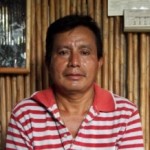A Guatemalan appeal court has overturned a not guilty verdict rendered by a judge last April in the murder and aggravated assault trial of former Hudbay Minerals’ security chief Mynor Padilla.
Padilla, 53, will now face a second criminal trial before a new Guatemalan judge in the high-profile case that could have serious implications for how Canadian mining companies operate overseas.
Padilla is charged in the shooting death of Adolfo Ich, a Mayan Q’eqchi’, during a Sept. 27, 2009 protest on contested land at Fenix nickel mine in El Estor, Guatemala. At the time, Padilla was employed by Compania Guatemalteca de Niquel (CGN), then a subsidiary of HudBay.
The former Guatemalan army officer is also charged in shooting German Chub, leaving the young father paralyzed from the chest down and with one functioning lung.
Ich’s widow, Angelica Choc, Chub and 11 Mayan women who alleged they were gang raped by mine security personnel have filed civil suits in Ontario Superior Court against Hudbay in a closely watched case with fundamental implications for Canadian mining companies. About two-thirds of the world’s mining companies are based in Canada.
“If HudBay is found liable in Canada, the case could establish corporate behaviour guidelines for Canadian mining subsidiaries overseas, which have a long history of human rights and environmental complaints,” the Toronto Star states.
Hudbay hailed Padilla’s acquittal last April. “We always believed in his innocence,” Hudbay spokesman Scott Brubacher told the Star.
After the verdict was overturned last month, Brubacher told the National Post it appeared to have been reversed on procedural grounds. The appeal court, however, refused a prosecution request to substitute a guilty verdict.
Murray Klippenstein, a Toronto attorney representing the Guatemalan plaintiffs in the civil suit against Hudbay, said Padilla’s criminal acquittal in April occurred despite “damning eyewitness testimony” about the murder as well as ballistic and forensic evidence linking Padilla and other security staff to the shooting,
Padilla was arrested almost three years after an arrest warrant was issued shortly after the 2009 shootings. He remained on the payroll of Hudbay’s Guatemalan subsidiary until he was taken into custody, according to the National Post. It took another three years for a trial that lasted a further two years and from which the public and media were mostly barred, ostensibly for security reasons, according to the Post.
Klippenstein stated in a September press release that the Guatemala criminal trial “featured numerous irregularities and disturbing events” including the “fact that Hudbay funded testimony in support of (Padilla), and an incident that occurred last September (2016) in which the home of Ich’s widow and children was the target of a midnight gunfire attack.”
Klippenstein also states that the security company hired by the mining company (and whose personnel were accused of the violence) was not authorized to provide any type of security, or to carry firearms – facts which a lawyer for the mining company obscured by falsifying documents.
Hudbay has repeatedly stated (here and here) that it is being falsely accused of human rights abuses at its overseas operations.
The company’s overseas operations are the focus of a 2015 documentary Flin Flon Flim Flam that reported on human rights abuses in Canada, Guatemala and Peru. The film shows Peruvian National Police, which is under contract with Hudbay, beating and teargassing peasants protesting the company’s operations.
The film’s producer, John Dougherty, was detained last April by Peruvian National Police after screening the film in Peruvian communities located near Hudbay’s Constancia Mine. The Peruvian Interior Ministry subsequently issued a travel ban prohibiting Dougherty from returning to Peru.
Dougherty is contesting the travel ban in Peruvian court. At the time of his detention, Hudbay had a contract with the national police. Hudbay claims it had no role in Dougherty’s detention and subsequent travel ban.


ATTACKING HUDBAY BASED ON ITS CURRENT INTERNATIONAL MINING ACTIVITIES IS NOT A SOLUTION AS TO WHETHER OR NOT ROSEMONT WILL EVER BECOME A COPPER MINE . MINING IS AND ALWAYS HAS BEEN A HIGH RISK BUSINESS TIED TO POLITICS , CORRUPTION , HUMAN RIGHTS VIOLATION , ENVIRONMENTAL DEGRADATION , ETC . MINING COMPANIES OPERATE IN JURISDICTIONS WHERE THEY CAN MAXIMIZE PROFIT . MANY RESOURCE RICH COUNTRIES DO NOT HAVE THE DOMESTIC MEANS TO DEVELOP THEIR MINERAL RESOURCES SO THEY SELL OUT TO FOREIGN MINING COMPANIES WITH DEEP POCKETS . OFTEN THESE COMPANIES CREATE LOCAL SECURITY OPERATIONS INVOLVING POLICE AND MILITARY TO DO THEIR DIRTY WORK .
CANADA IS WELL AWARE OF THE ACTIVITIES OF ITS MINING COMPANIES OPERATING INTERNATIONALLY AND HAS BEEN CREATING MORE RULES AND REGULATIONS FOR THESE ACTIVITIES . THE USA ALSO HAS MINING COMPANIES OPERATING INTERNATIONALLY THAT HAVE CREATED POLITICAL CHAOS IN CHILE , INDONESIA , ETC .
THE CURRENT ISSUES WITH THE DEVELOPMENT OF THE ROSEMONT COPPER PROSPECT ARE DOMESTIC . THE GOVERNMENT AGENCIES AT ALL LEVELS ARE FAILING THE PEOPLE , NOT HUDBAY . IF HUDBAY IS SUCH AN EVIL COMPANY , WHY WAS IT ALLOWED TO APPLY FOR A MINING PERMIT IN THE USA ? WHO LET THE FOX INTO THE CHICKEN COUP ?
PLEASE NOTE CORRECTION – ” CHICKEN COUP ” SHOULD READ CHICKEN COOP . MY APOLOGIES .